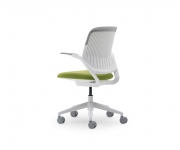By
Steelcase
Designed in
USA
Description
While collaboration is becoming part of everyday knowledge work, furniture hasn't changed to support it. The cobi chair was designed specifically to facilitate collaboration, to help keep participants focused and engaged. It is built on three key insights into collaboration seating: chairs should encourage movement and be comfortable for lengthy periods of time; adjustments should be automatic and intuitive; it should support multiple postures. Every part of cobi is designed to flex and adapt automatically to the user's body for more engaged and comfortable sitting, encouraging a variety of postures which the constantly changing focus of collaborative work demands.
Key Features
and/or Benefits
Cobi provides comfort automatically and supports four main postures - straight sitting, leaning backward, leaning forward, and leaning left or right. Yet cobi has only one simple manual adjustment: the seat height. A weight-activated mechanism takes care of the rest, naturally putting users in the best position of comfort. When a user first sits in the cobi, it senses their body weight and provides the adequate amount of support, adjusting the position to put the least amount of stress on the body. When users shift or move, cobi does the same, to maximise comfort.
Every part of cobi was designed to flex and adjust to the user's body. The flexing seat encourages users to move and shift in the chair, allowing them to sit in the centre or off to the sides. cobi supports a variety of postures, with the flexing fingers of the back supporting the body's posture at any given moment. cobi's top flexing edge lets users rest their arms comfortably on the top of the chair.
The design of the cobi started from a user-focused approach to supporting collaboration, paring down the essence of a chair to create a simple design with a minimum of material and adjustable parts. Friendly and inviting, the simple lines of the yoke shape direct all forces towards to the weight-activated mechanism, creating a freedom of movement that is based on the user's essential gravity, without or adjustment or any user input.
Cobi was designed in accordance with Cradle-to-Cradle principles using the Life Cycle Assessment (LCA) method for a long product life, and has received Cradle-to-Cradle Certification from MBDC in the United States. Its lightweight design uses less materials in manufacture, while enhancing mobility and extending use in multiple work settings. It contains 16% recycled content by weight. At the end of life, it is up to 90% recyclable by weight.

